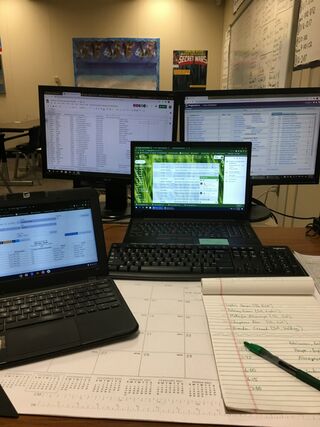Relationships
Teaching With Donuts, Multi-Screens, and Love
“[Kids] don't remember what you try to teach them. They remember what you are.”
Posted October 9, 2020
“[Kids] don't remember what you try to teach them. They remember what you are.” —Jim Henson
My two sons both teach high school. They are in the middle of the controversies, the parents suing administrators for having the kids physically go to the schools or their friends who sue them for doing all classes online. This is the year of online/partial classes, emergency homeschooling, sue the schools, hope-the-kids-are-learning-something (even a lot), when-will-we-get-back-to-normal education quandaries and events.

Take a look at this opening picture of four screens, and you will see what a high school teacher I know and love, my son, Dave had available to him for parent-teacher conferences last month. (Think we have gone electronic enough? Or social distancing enough?) Four screens: one for attendance, one for grades, one for his schedule and one for the lesson plans he has been teaching from.
Like so many districts he has not seen students since last March, but that will change soon as the students do show up at his school in southern Ohio. In his words he was perhaps “over-screened”, but I so appreciated seeing his dedication and his willingness to go the extra mile, have everything at his fingertips, on behalf of the parents who wanted a report on the status of their child. Dave reports how he is looking forward to seeing his students (half-classroom sizes for distancing purposes) and I have interviewed many a teacher and student on the way their district is managing through this situation and what they are doing as teachers and students. Lots of variation and dedication and frustration and willingness to “make-do.”
Dave’s older brother Jeff, equally beloved by yours truly, is also a teacher but in central Ohio. He created one of those little triumphant moments in his half-in-person/half on-line class. (Lest we forget, these are the moments that edges humanity upward and along.) He was teaching, in his mask and protective shield both, his combo on-line/in-person lesson, and this day one of the kids had brought in donuts to share.
So he made an offer to the kids online. He had them stay on Zoom on their device, listening to the lesson, and ride by the school where he has an outward-facing window. That way the kids who on line could still get a donut, handed out the window. (No, I don’t know if it was a gloved hand—don’t ruin the story with irrelevant questions.) Two of the 12 or so kids did just that: they had a donut, and more than that, they felt connected to their classmates and school, and to the subject matter, through the enthusiasm of a teacher sharing more than lessons with his students.
My guess is that teachers around America, (as well as the parents now teaching by default) around the world, are doing variations of this kind of teaching, all day, every day by the tens of thousands. Sure they are making mistakes and having bad days, but we can forgive them that. The students will. As long as this kind of passion for the topic and for the teaching process is at play.
This is the kind of teaching older generations owe to the younger ones, the ones they helped bring into the world. Sure, COVID had messed up a lot of our routines and systems and made things harder, but we can still teach with creativity and love and dedication. And let’s remember the words of Antoine de Saint-Exupéry.
"If you want to build a ship, don't drum up people together to collect wood and don't assign them tasks and work, but rather teach them to long for the endless immensity of the sea.”
If we want to build a better future, we model love and imagination.


